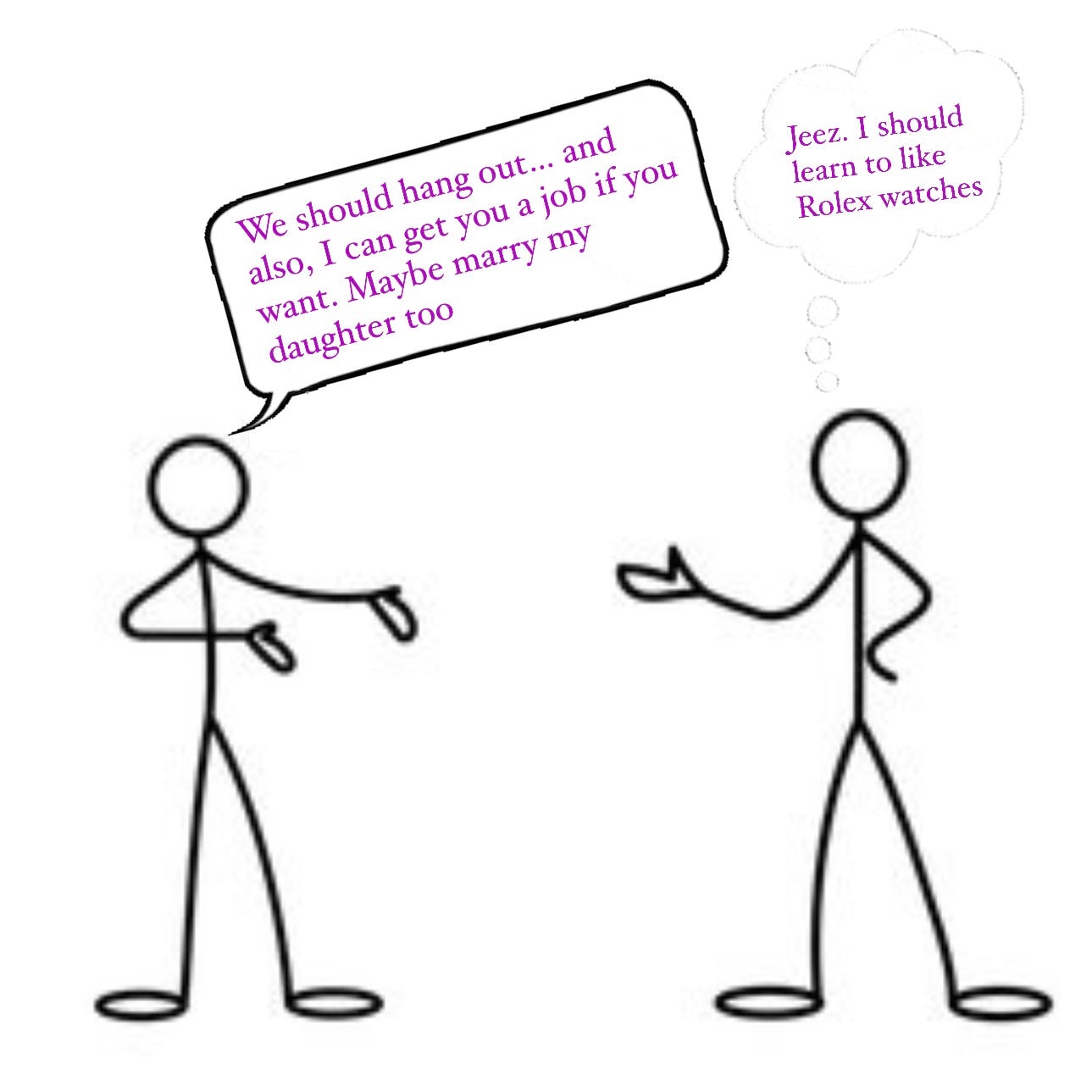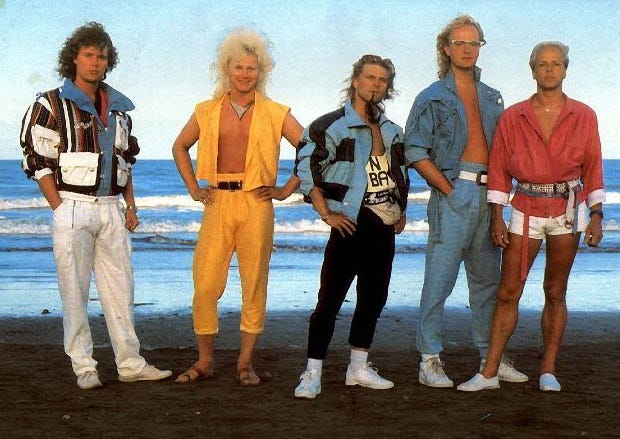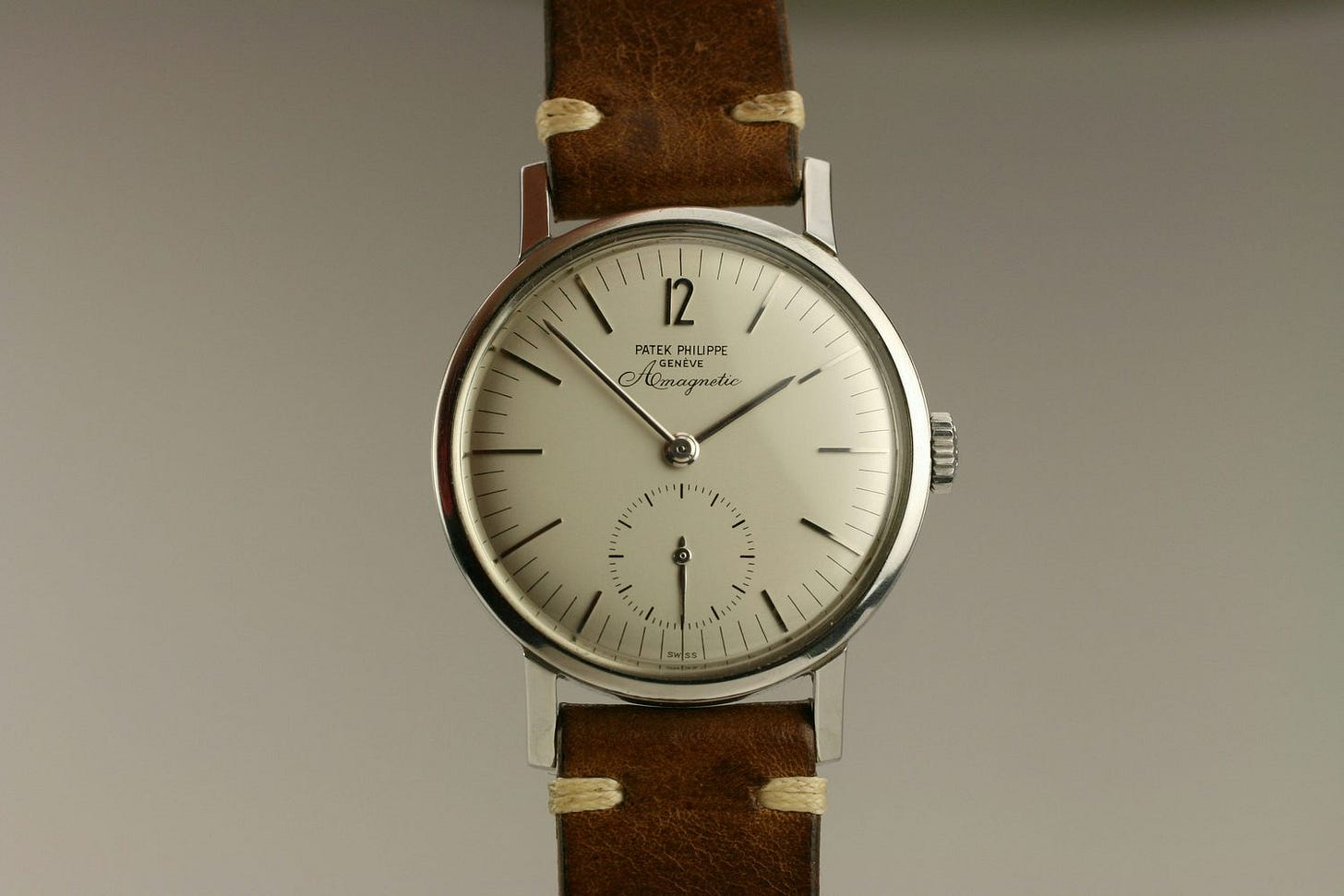Horology and Human Nature
The Unavoidable Social Dynamics of Watch Collecting
I previously discussed Pierre Bourdieu’s take on taste, but suspect that post went too deep. Let’s see what we can do with his findings, and how they they stack up against real-world games we play as collectors.
ScrewDownCrown is a reader-supported guide to the world of watch collecting, behavioural psychology, & other first world problems.
The Collector’s Dilemma
Consider this: Would you rather own a Rolex Submariner or an Invicta Pro Diver? In theory, both are dive watches with similar specs, yet we all ‘know’ the Rolex will get nods of approval at a watch meetup while the Invicta might get you kicked out. Is the Rolex really that much better, or have we simply internalised certain notions of prestige and value which cause us to perceive it that way?
The reality in our world is when it comes to social capital, not all watches are created equal. Owning certain pieces can, and does, elevate one’s status among other collectors. We may not always be conscious of it, but on some level our collections are shaped by a desire to fit in and be respected by our peers.
Recalling one of Bourdieu’s ideas - we like things if the liking of these things might benefit us. If that’s the case, taste is a function of: (1) One’s understanding of the cultural and social context when it comes to things one could like; and (2) One’s cultural and social knowledge to know what exactly to like or avoid.
In watch collector speak: Taste is a function of two things. In (1) above, that is understanding where Rolex stands in relation to Hublot, or where Journe stands in relation to Moser… that’s context and for the most part, this context is widely understood (I think!). Then (2) is more about knowing what to say when a collector asks what your favourite brands are, or knowing not to discuss finishing quality when you talk about Rolex which is a mass-produced watch.
In essence, your brain functions much like a strategist playing out game theory scenarios. It assesses the social landscape: Are Journes the favoured choice among these peers? Do they understand what Romain Gauthier actually does in his manufacture? Could embracing Roger Smith boost or harm your social capital? Do you grasp the norms surrounding haute horology well enough to fit in seamlessly? If the answers align, then it’s time to develop a liking for whatever brand seems appropriate.
What’s intriguing, albeit unsettling, is that much of this process occurs beneath the surface of conscious thought. As social beings, we instinctively pick up on cues and adjust our behaviour to navigate social hierarchies, all without actual conscious deliberation.
But does that seem correct to you? Or at least, is that all that’s going on?
When you look at this picture, what do you think? I can’t help but think the baggy shirts look insane, and that’s not even the half of it. Given who I am, it seems obvious I wouldn’t like them. Is that accurate? If we were in the 80’s, I’d probably think these outfits were okay, just like everyone else. And if it was the 1900s, I might wonder why they aren’t wearing tall hats and tailored suits.
So why might we dislike these outfits? Well, since the 1980s, fashion has changed, and we’ve picked up on those changes. We’ve picked up on them so much that they feel like they're just a part of us now. Our “beliefs.” So if random shifts in culture can go that deep into our brains, what else is sneaking in there without us noticing?
The Glass Bead Game
The Glass Bead Game, or “Das Glasperlenspiel,” serves as the central focus of Nobel Prizewinner Herman Hesse’s novel. Hesse presents a richly detailed exploration of a future society set in a fictional place, Castalia, where monastic scholars dedicate themselves to the practice of the Glass Bead Game. This game, shrouded in mystery and complexity, serves as a synthesis of all human knowledge, aiming to link disparate fields such as music, mathematics, philosophy, and history into some sort of ‘harmonious whole.’
At the center of the narrative is Joseph Knecht, who begins his journey by encountering the enigmatic Music Master, a pivotal figure in Castalia. Through his experiences within the monastic order, Knecht grapples with the rules and rituals of Castalian life, as well as the broader implications of the Glass Bead Game on society.
As Knecht ascends within Castalia, he forms connections with influential figures, including members of the upper class, and embarks on missions to bridge the gap between Castalia and the outside world, particularly the Catholic Church. His dedication to the Glass Bead Game is unwavering, and he eventually achieves the prestigious title of Magister Ludi, or Master of the Game.
Throughout the novel, Hesse delves into philosophical inquiries regarding the role of intellectuals in society. Knecht’s journey prompts him to question whether the pursuit of knowledge within Castalia truly serves humanity… or simply perpetuates some form of a circle-jerk for people inclined towards intellectualism. He grapples with the tension between specialisation and broader understanding, recognising the limitations of theoretical pursuits which are blatantly disconnected from the real world.
I drew some parallels with watch collecting here… pursuits such as perfecting timekeeping versus actual engagement with the real world and whether anyone truly cares about this, could be one angle to consider, but that’s not all. One could dedicate their leisure time to indulging in a passion for pre-1980 vintage dress pieces from Patek Phillipe, immersing oneself in articles and forums about each reference.
Alternatively, one could delve into the complexities of behavioural psychology, engaging in debates about decision theory, perhaps focusing on the ideas of Kahneman and Tversky and relating them to watch collecting. If you’ve been a reader of SDC for a while, you will know what my choice is.
Why might I gravitate towards the latter pursuit? Perhaps it’s because while I may never have the means to afford the aforementioned Patek Philippe watches, I perhaps excel in discussing abstract concepts (and perhaps not, but that isn’t the point)?
This choice reflects a broader pattern: individuals tend to invest their time and energy in pursuits where they feel they have a comparative advantage. Those with financial means often engage in the pursuit of luxury goods and other status symbols, while those with cultural capital lean towards intellectual endeavours like the Glass Bead Game. Ultimately, we all play the game we believe we can excel in, driven by our individual strengths and interests.
Is that it, though?
Perceived Value
I’m fairly confident that I could win a debate with Dan Bilzerian on the intricacies of behavioural psychology and a discussion about decision making. However, when it comes to a contest involving jet-setting between luxurious mansions while being pampered by naked models, Bilzerian would destroy me.
In theory, Bilzerian and I could acknowledge that our pursuits of status differ and coexist without conflict. Yet, in reality, this mutual respect seems elusive. Individuals like myself tend to dismiss opulent displays of wealth, scoffing at gold-plated hand guns, and vehemently asserting our disinterest in such extravagances. We insist that our preference for intellectual pursuits - like discussing taste - is entirely genuine and unrelated to our inability to partake in ostentatious displays of affluence.
On the other hand, individuals like Bilzerian may view people like me as inferior, believing that we’ve concocted intellectual games as a feeble attempt to compensate for our inability to succeed in what he perceives as the true game of life.
When I see someone splurging $1700 on a watch strap from Atila Aszodi, I label it as “wasteful” because I don't place value on such items. However, the notion of “waste” is subjective and rooted in individual value judgments. Consider the pastimes favoured by participants in the Glass Bead Game, delving into the minutiae of random shit like Arabian date markets.
While proponents of these pursuits may argue that they are intellectually enriching and resource-efficient, one might question whether they truly contribute to societal betterment or simply serve as a means of flaunting one’s “cultural sophistication”.
Another thing to remember… time, itself, is a valuable resource. The extensive dedication to intellectual pursuits - like the Glass Bead Game - could have been redirected towards alternatives. So, wastefulness exists in various forms, it just comes down to our individual perception of value and priorities.
Watch Games
Okay, so what sort of games can we pick out in the collecting world? Here are a few to make the point, and I urge you to share some of your own examples in the comments later.
The Vintage Game
This dynamic plays out in interesting ways when it comes to vintage watches. An old 3417 Patek Philippe Amagnetic might not look like much to an outsider, but to a seasoned collector, it’s a grail watch which oozes cultural cachet. Owning one is a signal that you’re something of a connoisseur, not some nouveau riche chump who rushes off to buy the most expensive RM they can get an allocation for.
Fine, but let’s be real - is an old 3417 really a better watch than a mint condition modern piece, possibly still under warranty? Arguably not from a pure functionality and reliability standpoint. The real value is in the cultural capital it bestows. This includes the appreciation for its history, the nature of the piece’s influence on the brand’s later offerings and perhaps even the impact of the piece’s success on the success of the brand itself. This is all still a matter of cultural capital. Collecting vintage is a way to distinguish oneself, to show you’re above the ‘crass commercialism of the modern luxury watch market’.
The Flex Game
On the other end of the spectrum, we have ‘fuccbois’ who are all about flexing their economic might. They are perhaps rocking gemset Daytonas or Richard Milles, and posting wrist shots from their first class seats adorned with the customary glass of champagne and a Goyard credit card holder. For them, watches are a signalling tool. Their game stands in stark contrast to the vintage nerds, but it’s a game nonetheless.
Interestingly, the vintage crowd typically enjoys hating on the flex lot. “All those diamond-encrusted monstrosities, how gauche!” The funny part about this, is their disdain is its own kind of flex. A way of saying “I’m so secure in my cultural superiority, I don’t even need to resort to these overt displays of wealth.”
The Contrarian Game
We can’t forget the contrarians… The ones who take pride in liking what everyone else hates. They’ll sing praises of Hublot just to get a rise out of AP snobs. In theory this is about ignoring social influences and liking what you like… But if you go deeper, it’s a way to signal you’re above the status games everyone else is playing. You’re ‘obviously’ not a sheep following the herd, you’re an independent thinker.
This gets quite meta. In watch collecting circles, showy contrarianism is its own form of conformity. Hating on Rolex is almost as cliche as lusting after them. The real rebels are the ones who can coolly assess the merits of both a Submariner and an Invicta Pro Diver without feeling it somehow informs their own identity.
What other games can you think of?
Conclusion
At the end of the day, these games and dynamics are an unavoidable part of being a watch enthusiast … or any kind of enthusiast, really. Our preferences are inextricably tied to culture and social influences. You can try to opt out and just like what you like, but arguably that becomes a game too - just on a different level.
So what is a watch lover to do? Refine your tastes, but don’t take yourself too seriously. Recognise the social dimensions of this hobby, but don’t let it make you (too) cynical. Enjoy watches for their craftsmanship and the way they make you feel. Bond with fellow enthusiasts over your shared passion. Above all else, maintain a healthy sense of perspective and humour about all the status jockeying and one-upmanship, because it is in fact, an intrinsic part of the game!
Believe it or not, that “❤️ Like” button is a big deal – it serves as a proxy to new visitors of this publication’s value. If you enjoyed this post, please share it. Thanks for reading!










“So what is a watch lover to do? Refine your tastes, but don’t take yourself too seriously. Recognise the social dimensions of this hobby, but don’t let it make you (too) cynical. Enjoy watches for their craftsmanship and the way they make you feel. Bond with fellow enthusiasts over your shared passion. Above all else, maintain a healthy sense of perspective and humour about all the status jockeying and one-upmanship, because it is in fact, an intrinsic part of the game!”
EXACTLY! all about perspective! ….. and humility and non judgmentalism! Because if you’re into any of it you can’t NOT play the game from some aspect
Great read ….. “we have met the enemy and he is us” Walt Kelly from the comic strip Pogo 😉🫡
“In watch collector speak: Taste is a function of two things.”
I just wanted to add to this observation that the examples you use are specific to liking/disliking brands, but it could equally be about conveying other preferences: “I only like and wear precious metal; I only like vintage because modern feels soulless; I like movements but not brands and my parents didn’t love me; etc.